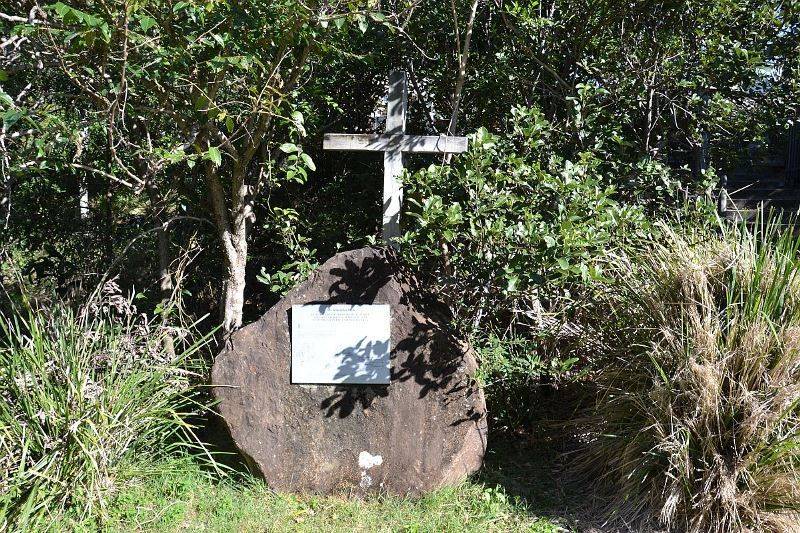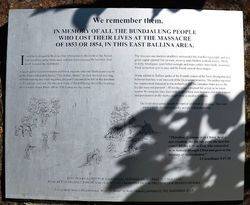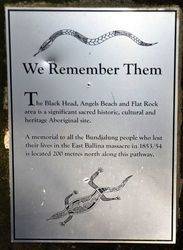
East Ballina Massacre SitePrint Page 
The monument commemorates the Bundjalung people who were killed in the Black Head massacre.
There is a strong oral tradition amongst the Bundjalung Aboriginal community that a massacre occurred in the 1850s at an old campsite at East Ballina. The oral tradition includes stories of escape, of people who were shot and were laid to rest in the forests north of the camp, and of those who were driven off the cliff at Black Head. There is a belief that some victims of the massacre were never buried, their bodies being either dumped off the cliff at Black Head or abandoned on Angels Beach.
Follow the pathway at the northern end of Shelly Beach Road. The monument is located about 100 metres along the path on the left hand side.
Note : Some of the wording on the monument inscription is from "Seventy-Five Years on the Richmond. 1847-1922. James Ainsworth's Reminiscences" which was originally published in the Ballina North Coast Beacon.
Location
| Address: | Shelly Beach Road , East Ballina, 2478 |
|---|---|
| State: | NSW |
| Area: | AUS |
| GPS Coordinates: | Lat: -28.856901 Long: 153.596659 Note: GPS Coordinates are approximate. |
Details
| Monument Type: | Monument |
|---|---|
| Monument Theme: | Conflict |
| Sub-Theme: | Frontier |
| Actual Event Start Date: | 31-December-1853 |
| Actual Event End Date: | 01-January-1854 |
| Link: | https://c21ch.newcastle.edu.au/colo… |
Dedication
| Actual Monument Dedication Date: | Saturday 11th August, 2001 |
|---|
We remember them.
In memory of all the Bundjalung people who lost their lives at the massacre of 1853 or 1854, in this East Ballina area.
It had been alleged in Brisbane that Aborigines to the north of the Tweed had murdered some white men, and that those responsible had then fled south towrads the Richmond. A small patrol of white troopers and black trackers rode into Ballina and stayed at the Ainsworth public house, "The Sailors Home." At 3am the next morning, without making any local inquiries, the patrol ascended the hill in the direction of the present reservoir. On the clear slope of the hill facing the valley reaching over towards Black Head, 200 to 300 Aborigines lay asleep.
The troopers and trackers stealthily surrounded the slumbering people and at a given signal opened fire on men, women, and children without mercy. Thirty to forty Aborigines were killed outright and many others were badly wounded. Their unmarked graves may still be found around these ridges. White settlers in Ballina spoke of the friendly nature of the local Aborigines and believed that they were innocent of the Queensland murders. The settlers reported the unprovoked massacre to the authorities but the intruders from across the border were not pursued. When the settlers pressed for action to be taken against the troopers, they were told to mind their own business and were warned that persistence in the matter might lead to trouble for them.
The local Aborigines sought no reprisal and took no revenge. The local white people showed sympathy and provided assistance.
"Therefore, if anyone is in Christ, he is a new creation; the old has gone, the new has come ! All this is from God, who reconciled us to himself through Christ and gave us the ministry of reconcilliation." 2 Corinthians 5 : 17 - 18
Erected by a group of Aboriginal and Non-Aboriginal Australians in an act of reconciliation, and in acknowledgement of the truth of our shared history.
History taken from oral tradition and "Rivers of Blood" by Rory Medcalf, published by The Northern Star.
We remember them
The Black Head, Angels Beach and Flat Rock area is a significant sacred historic, cultural and heritage Aboriginal site.
A memorial to all the Bundjalung people who lost their lives in the East Ballina massacre in 1853 / 54 is located 200 metres north along this pathway.
























